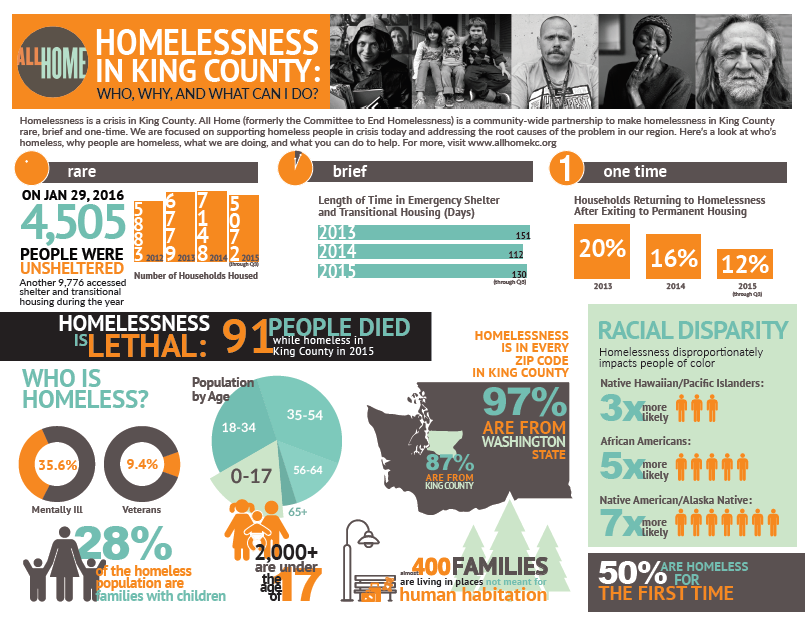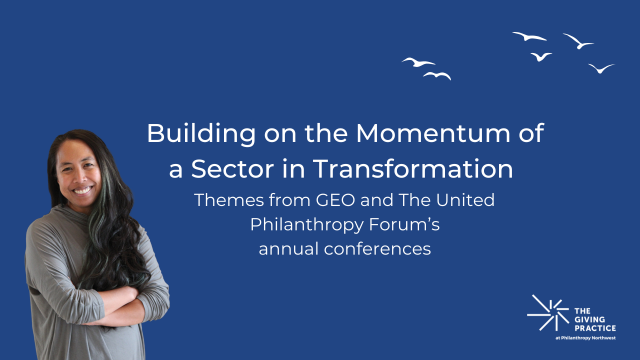Homelessness and lack of affordable housing have reached crisis levels locally, regionally and nationally.
In Multnomah County, Oregon, more than 3,800 people sleep on the streets, in shelter and in temporary housing every night. In November, Seattle Mayor Ed Murray and King County Executive Dow Constantine declared homelessness has become a state of emergency. This declaration activated public funds to address the needs of the 10,688 people experiencing homelessness each night in the county, unlocking $7.5 million in crisis intervention and $1 million in prevention and diversion strategies.
But the crisis declaration also left funders wondering where their investments would be most useful and, more specifically, what should philanthropy's role be in addressing homelessness? Are there holes in funding that public dollars cannot fill, where philanthropy could step in?
Last week, Philanthropy Northwest and the Medina Foundation joined with All Home King County to convene a group of funders and stakeholders to talk about the challenges and opportunities around housing in our region. The August 10 discussion included Philanthropy Northwest members Boeing, Campion Foundation, The Ford Family Foundation, Pride Foundation, Satterberg Foundation, Schultz Family Foundation and other organizations interested in understanding the issues more clearly.
All Home’s Director Mark Putnam, the City of Seattle's Jason Johnson and King County's Mark Ellerbrook shared draft findings and recommendations from an upcoming report, highlighting findings from a system and investment analysis of the homelessness system in King County funded with support from the United Way of King County.

"The status quo is not acceptable," Putnam said. We may not be able to prevent the range of personal crises that lead to the loss of a stable home, he added, but any instance of homelessness should be "rare, brief and one-time."
What Can Philanthropy Do?
Recent voter-approved levies (King County Best Starts for Kids and Seattle Housing) have provided additional resources for homelessness prevention and affordable housing. In the meantime, King County, the United Way of King County and the Raikes Foundation have made new and expanded investments in shelter diversion strategies and services, working on a coordinated effort to reduce the screening criteria across the system to make programs and services more accessible for individuals experiencing or at risk of being homeless.
For funders interested in investing more strategically in efforts already underway, what's the best way to help? Mark provided several suggestions for where additional support is needed to move forward the five-year strategy to reduce homelessness and put housing first:
- Bring shelter diversion to scale, by providing flexible financial assistance to individuals and families that would allow them to stay in place or avoid being homeless. This can include paying for first- and last-month's rent, connecting people to family with stable housing, and providing financial aid for other expenses so that rent can be prioritized.
- Invest in enhancing shelter programs that provide wrap-around support services, 24 hours a day and seven days a week, as opposed to current options that are predominantly overnight, emergency and seasonal options.
- Rapid rehousing, which requires creating more rental housing in the market and share housing options.
- Support building the capacity of programs and service providers, including training around diversion.
- Build evaluation capacity of programs and agencies to conduct evaluation and to increase staffing capacity for data analysis.
Participants offered additional ideas, including:
- Investing in public education and communication campaigns to increase public will for policy change and funding for homeless interventions and housing programs.
- Specialized housing programs for specific populations, including veterans and LGBTQ youth.
- Investing in new affordable housing development.
"With Seattle and King County’s recent assessment of homelessness efforts, we are at a critical moment to align broader efforts across the community to transform homeless systems," said Jamie Hackleman, philanthropic partnerships director at Vulcan, Inc. "Through public-private partnerships, we can house more people and eliminate barriers to shelter and services, and philanthropic funders are well positioned to cover gaps and needs in the community."
Join the Discussion
Do you have thoughts about roles philanthropy can play in the key strategies outlined? Do you have other ideas for how we can make homeless in the region rare, brief and one-time? Share in the comments section below and join us Under One Sky at our conference in Missoula, Montana next month for a symposium on homelessness and affordable housing — an opportunity to compare notes on what's happening in our communities and consider local models that may work regionally.
Maya Thornell-Sandifor is Philanthropy Northwest's director of learning strategy. She can be reached at msandifor@philanthropynw.org.


